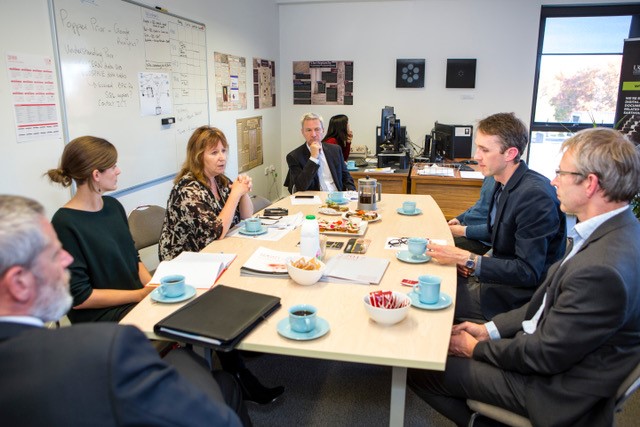On Tuesday the UC Arts Digital Lab, main office of the CEISMIC earthquake digital archive, hosted Hon Clare Curran, the current Minister of Broadcasting, Communications, and Digital Media, and Minister of Government Digital Services.

The Minister was welcomed to campus by Vice Chancellor Rod Carr and Pro-Vice Chancellor of Arts Jonathan Le Cocq to join Digital Humanities programme director Dr. Christopher Thomson, Arts Digital Lab co-director Associate Professor Donald Matheson, Lab staff, and postgraduate students working in the field of Digital Humanities for afternoon tea and discussion.
As a part of her visit, the Minister was interested in learning more about the successes and challenges of CEISMIC, the federated digital archive that was established by UC in the wake of the 2010/2011 Canterbury earthquakes. She asked about how CEISMIC managed to establish itself following a period of crisis and the legacy it has left behind for other populations that may be faced with disaster.
“This was a great opportunity to communicate to the Minister the value of the CEISMIC digital archive, and to highlight the ways in which UC was able to coordinate a range of different consortium partners to contribute their data to a repository that has served as a key digital resource for both researchers and community organisations,” says Dr. Christopher Thomson.
The CEISMIC programme led by Professor Paul Millar (UC English) in 2012 has since grown into a broader initiative of Digital Humanities teaching and research at UC, as well as the establishment of the UC Arts Digital Lab. “Through the successes of CEISMIC, UC Arts has been able to provide a programme of study that increases our students’ digital literacy while cultivating critical thinking and an understanding of culture and society,” says Professor Jonathan Le Cocq.
The Minister also discussed with the group issues facing the current digital landscape such as data governance, privacy issues, and the need for open and publicly accessible media. She noted the increasingly dispersed nature of digital media spaces and the need to ensure that public digital media remain independent and separate from commercial practice.
“The whole Facebook and Cambridge Analytica debacle is a great example of how our data can be misused without our knowledge,” says Associate Professor Donald Matheson. “The need to be able to understand and critically interrogate the underlying structures and frameworks of the contemporary digital world is increasingly pertinent.”